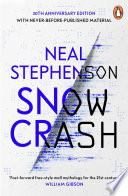

Snow Crash introduces the idea of a virtual reality space called the Metaverse, where users interact through avatars. This concept foreshadows modern-day virtual worlds and online social platforms. The Metaverse serves as a digital extension of reality, allowing for social interaction, commerce, and even conflict in a fully immersive environment. The book explores how this virtual realm impacts human behavior and societal structures, emphasizing the potential for technology to alter our perceptions of reality and identity. The Metaverse reflects the growing trend of digital existence, where individuals may prioritize their online personas over their physical selves. This idea resonates with contemporary discussions about virtual reality, augmented reality, and the future of human interaction in digital spaces.
Continue readingOne of the central themes in Snow Crash is the idea that language and information can act as viruses. The protagonist, Hiro Protagonist, discovers that an ancient Sumerian language has the power to control human minds, paralleling the way modern media and technology can influence thoughts and behaviors. This concept raises questions about the nature of language, communication, and the impact of digital information on culture. It suggests that language is not just a tool for communication but also a medium that can shape reality and consciousness. The book delves into the implications of this idea, particularly in the context of how information spreads in the digital age, and serves as a cautionary tale about the power of language and the potential dangers of manipulating it.
Continue readingSnow Crash presents a dystopian future where corporate entities have replaced government functions, leading to a fragmented society. This reflects concerns about the increasing power of corporations in the real world and their influence over individual lives and communities. The book portrays a world where privatization has gone to extremes, resulting in a lack of social cohesion and the rise of micro-nations governed by corporate interests. This idea critiques the current trajectory of capitalism and raises questions about the balance of power between corporations and the state. It serves as a warning about the potential consequences of unchecked corporate power and the importance of maintaining a democratic society that prioritizes the welfare of its citizens.
Continue readingSnow Crash explores the relationship between technology and human evolution, suggesting that technological advancements can lead to significant changes in human society and behavior. The book posits that just as language shaped early human societies, modern technology is reshaping our interactions and cultural practices. This theme raises questions about the ethical implications of technology and its role in shaping human identity and community. It also reflects concerns about the digital divide and the impact of technology on social equity. The narrative encourages readers to consider how technology can enhance or hinder human potential and the importance of ensuring that technological advancements serve the greater good.
Continue readingIn Snow Crash, characters navigate multiple identities, both in the physical world and the Metaverse. This exploration of identity highlights the complexities of self-perception in a digital age, where individuals can curate their online personas. The book raises questions about authenticity, representation, and the impact of digital interactions on real-world relationships. It challenges readers to think about how technology influences their sense of self and the ways in which they connect with others. This theme is particularly relevant in today's context, where social media and online platforms play a significant role in shaping individual identities and community dynamics.
Continue readingSnow Crash weaves together elements of mythology and technology, suggesting that ancient stories and beliefs continue to influence contemporary society. The protagonist's quest to understand the Sumerian language and its connection to the Snow Crash virus illustrates the enduring power of myth in shaping human experience. This interplay raises questions about the relevance of ancient narratives in a modern, technologically-driven world. It suggests that mythology can provide insights into human behavior and societal structures, and that understanding these connections can help us navigate the complexities of the present. The book encourages readers to explore the relationship between myth, culture, and technology in their own lives.
Continue readingAmidst the chaos of a fragmented society, Snow Crash emphasizes the importance of community and human connection. The characters' journeys highlight the need for collaboration, mutual support, and shared experiences in overcoming challenges. This theme resonates with contemporary concerns about isolation and the impact of technology on social relationships. The book advocates for the value of community in fostering resilience and adaptability in the face of adversity. It encourages readers to reflect on their own connections and the role of community in their lives, particularly in an increasingly digital world where physical interactions may be limited.
Continue readingThe reading time for Snow Crash depends on the reader's pace. However, this concise book summary covers the 7 key ideas from Snow Crash, allowing you to quickly understand the main concepts, insights, and practical applications in around 20 min.
Snow Crash is definitely worth reading. The book covers essential topics including The Concept of the Metaverse, Language as a Virus, Corporate Control and Fragmented Society, providing practical insights and actionable advice. Whether you read the full book or our concise summary, Snow Crash delivers valuable knowledge that can help you improve your understanding and apply these concepts in your personal or professional life.
Snow Crash was written by Neal Stephenson.
If you enjoyed Snow Crash by Neal Stephenson and want to explore similar topics or deepen your understanding, we highly recommend these related book summaries:
These books cover related themes, complementary concepts, and will help you build upon the knowledge gained from Snow Crash. Each of these summaries provides concise insights that can further enhance your understanding and practical application of the ideas presented in Snow Crash.